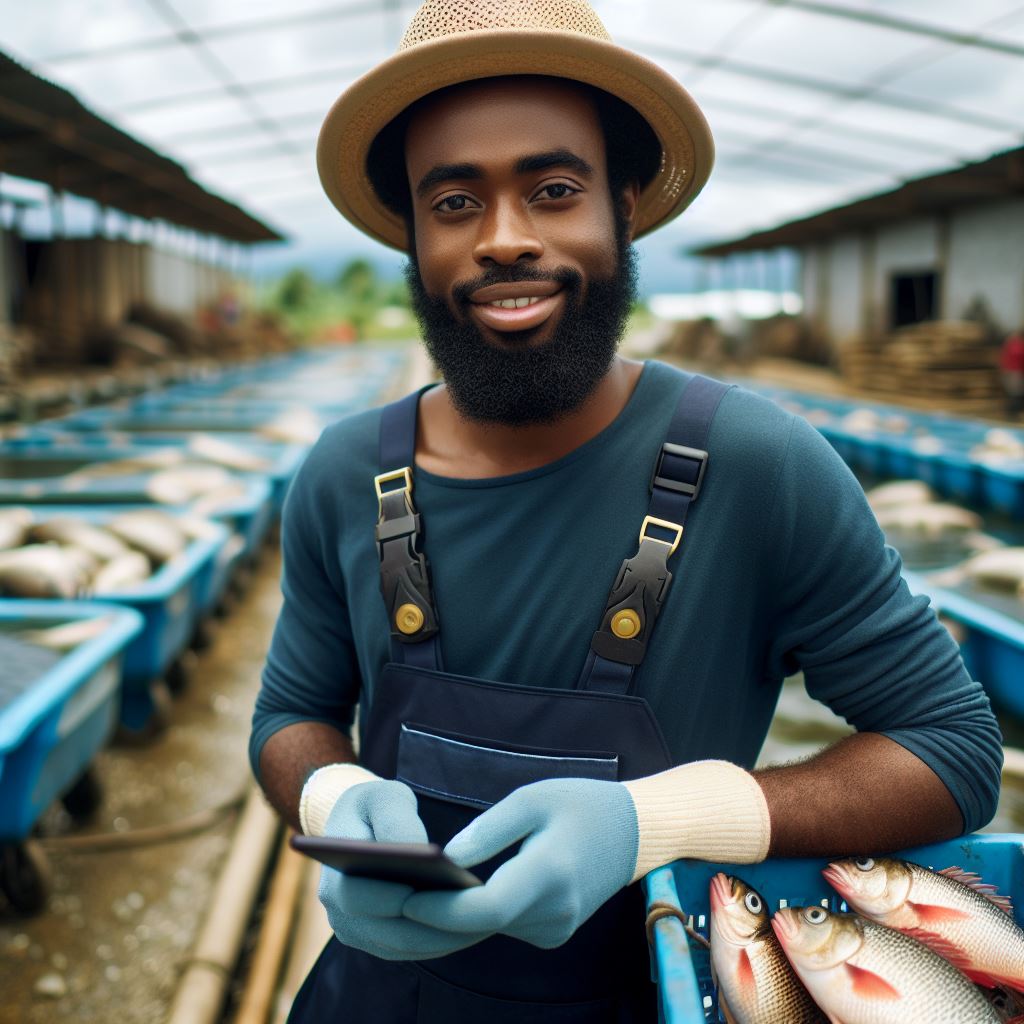Introduction
In this blog post, we will explore the journey From Nigerian University Classroom to Fish Farm.
Nigerian Education System in a Nutshell
Nigeria’s educational landscape is diverse, spanning formal schooling structures from primary to tertiary levels.
Government emphasis on academics remains pronounced, yet gaps persist in practical skill development.
Vitality of Practical Experience for Students
The significance of hands-on experience can’t be overstated.
While theoretical knowledge forms the foundation, practical application solidifies understanding.
This integration is increasingly acknowledged for holistic education.
Transitioning from Classroom to Vocational Opportunities
In recent years, Nigerian universities are steering towards a paradigm shift—actively bridging the gap between classroom instruction and real-world application.
One notable transition has been witnessed in the agricultural sector, particularly fish farming.
Education reforms now emphasize intertwining theoretical teachings with vocational opportunities.
These initiatives aim to nurture a breed of graduates well-versed not only in theories but also in practical applications relevant to their fields.
Such transitions align with Nigeria’s economic diversification goals and youth empowerment strategies.
By immersing students in practical experiences like fish farming, universities create avenues for skill development, entrepreneurship, and employment.
Through strategic partnerships with industry experts and local enterprises, universities provide platforms for students to delve into hands-on experiences.
These experiences not only supplement classroom teachings but also instill invaluable skills demanded by the job market.
In essence, this shift isn’t just about augmenting curriculum but fostering a holistic educational journey.
It’s about empowering students with a blend of knowledge and skills that seamlessly integrate with real-world challenges, ensuring their readiness to contribute meaningfully to society.
In the subsequent sections, we will delve deeper into specific case studies of Nigerian universities pioneering this transition, particularly in the realm of fish farming.
These examples will spotlight the transformative impact of merging classroom learning with practical experiences, offering insights into the promising future of Nigerian education.
Case Study 1: University of Ibadan
Background information on the university
- Established in 1948 as the first university in Nigeria.
- Ranked among the top universities in Africa.
- Offers a wide range of academic programs in various disciplines.
Academic programs offering practical training in agriculture
- Faculty of Agriculture with departments like Animal Science and Crop Protection.
- Offers courses that focus on practical training in fish farming and aquaculture.
- Has modern facilities and laboratories to support hands-on learning in agriculture.
Success stories of graduates who ventured into fish farming
- Oluwatobi Adeyemi graduated from the Department of Animal Science and started his own fish farm.
- With the knowledge gained, he successfully cultivated different species of fish and expanded his business.
- He now supplies fish to markets and restaurants, creating employment opportunities for others.
Impact of practical experience on employment opportunities
- Graduates with practical training in agriculture, particularly fish farming, have higher chances of employment.
- As the demand for fish continues to rise, there is a need for skilled professionals in the industry.
- Practical experience gained during university studies gives graduates a competitive edge in the job market.
Overall, the University of Ibadan stands out as a leading institution in Nigeria, offering academic programs that provide practical training in agriculture.
The success stories of graduates who ventured into fish farming demonstrate the positive impact of practical experience on employment opportunities.
With the increasing demand for fish, these graduates are not only finding employment but also creating jobs for others in the industry.
The university’s commitment to equipping students with the necessary skills and knowledge in fish farming has positioned its graduates for success in the field.
Read: Fisheries in Nigeria: Linking Theory, Practice, and Community
Case Study 2: University of Nigeria, Nsukka
Introduction to the university’s agriculture department
The University of Nigeria, Nsukka, is known for its leading agriculture department, offering comprehensive programs and initiatives to promote fish farming among its students.
Programs and initiatives promoting fish farming among students
The university offers various programs and initiatives that aim to educate and equip students with the necessary knowledge and skills for successful fish farming ventures.
One of the key programs is the Bachelor of Agriculture in Fisheries and Aquaculture, which provides students with a solid foundation in fish farming techniques, aquatic ecology, and fish nutrition.
The university organizes workshops, seminars, and training sessions where students can acquire practical skills in fish pond management, fish breeding, and marketing strategies.
There are internship opportunities offered by the agriculture department, allowing students to gain hands-on experience in fish farm operations and learn from industry professionals.
Testimonials of graduates who successfully established fish farms
Several graduates from the University of Nigeria, Nsukka have gone on to establish their own successful fish farms, showcasing the effectiveness of the university’s programs and initiatives.
One such graduate, Chinedu, shared his experience of starting a fish farm soon after graduating.
He emphasized how the knowledge gained from the university helped him overcome challenges and achieve profitability in his venture.
Another graduate, Ada, highlighted the importance of practical training and mentorship provided by the university, which played a crucial role in her successful fish farm establishment.
These testimonials from successful graduates serve as inspiration for current students, encouraging them to pursue fish farming as a viable career option.
Collaboration with local communities and government agencies
The University of Nigeria, Nsukka recognizes the significance of collaboration for the advancement of fish farming in the region.
By partnering with local communities and government agencies, the university aims to create a supportive network that fosters knowledge exchange, resource sharing, and market development.
Through collaborations, the university facilitates research projects that address local fish farming challenges, such as disease management, feed sustainability, and environmental impact.
The university also actively engages with government agencies to advocate for policies that promote sustainable fish farming practices and create a conducive business environment for fish farmers.
In fact, the University of Nigeria, Nsukka, stands as a shining example of how academic institutions can play a vital role in promoting fish farming.
Through its comprehensive programs, practical initiatives, success stories of graduates, and collaborations with local communities and government agencies, the university has become a catalyst for the growth and development of the fish farming industry in Nigeria.
Read: Evolving Role of Technology in Nigerian Aquaculture Education
Transform Your Career with Expert Guidance
Get personalized mentorship consulting that’s tailored to your unique path. Our expert advice is actionable and exclusive.
Get Started
Case Study 3: Ahmadu Bello University
Overview of the university’s agricultural curriculum
Ahmadu Bello University (ABU), located in northern Nigeria, offers a comprehensive agricultural curriculum.
The university’s agricultural program encompasses various fields, including crop production, animal husbandry, and aquaculture.
ABU provides students with a strong foundation in theoretical knowledge and practical skills related to agriculture.
Specific courses or research focused on aquaculture
ABU’s Department of Fisheries and Aquaculture offers specialized courses and conducts research in aquaculture.
Students can enroll in courses like “Introduction to Aquaculture,” “Fish Farm Management,” and “Aquatic Environmental Management.”
These courses cover topics such as fish breeding, pond management, water quality monitoring, and diseases in aquaculture.
Achievements and recognition in the field of fish farming
ABU has achieved significant milestones and gained recognition in the field of fish farming.
The university has successfully implemented innovative fish farming techniques and technologies.
Their research efforts have contributed to the development of sustainable aquaculture practices in Nigeria.
ABU’s graduates have excelled in the fish farming industry and have been recognized both nationally and internationally for their contributions.
The university consistently produces highly skilled professionals who contribute to the growth of Nigeria’s aquaculture sector.
Incubation centers and support for entrepreneurial ventures
ABU has established incubation centers to support entrepreneurial ventures in the field of aquaculture.
These centers provide training, mentorship, and financial support to aspiring fish farmers and aquaculture entrepreneurs.
Through these initiatives, ABU aims to foster innovation, create employment opportunities, and promote economic growth in the aquaculture sector.
Incubation centers also facilitate collaboration between academia, industry, and government bodies, leading to the development of sustainable aquaculture practices.
In short, Ahmadu Bello University’s agricultural curriculum offers a comprehensive and interdisciplinary approach to aquaculture education.
Their specialized courses and research in fish farming contribute to the development and promotion of sustainable aquaculture practices in Nigeria.
The university’s achievements in the field of fish farming, coupled with their support for entrepreneurial ventures, demonstrate their commitment to the growth and advancement of the country’s aquaculture sector.
Read: Innovative Practices in Nigerian Crop Farming
Challenges and Opportunities for Nigerian Universities
Limited resources and infrastructure
- Nigerian universities face challenges due to limited funding and inadequate infrastructure.
- Insufficient resources can affect the quality of education and research output.
- Lack of modern facilities and equipment hinders the practical learning experience for students.
- Limited access to libraries, laboratories, and research centers constrains academic progress.
Need for more government support and funding
- Nigerian universities require increased government support and funding to overcome resource limitations.
- Adequate funding would enable universities to improve infrastructure and upgrade facilities.
- Higher education institutions can only excel with increased financial investments and support.
- Government initiatives should prioritize education and allocate more funds for university development.
Importance of industry-academia collaboration
- Collaborations between universities and industries are vital for knowledge sharing and research advancements.
- Industries can provide real-world challenges and opportunities for students and faculty.
- Such collaborations foster innovation and practical skills development among students.
- Industry partnerships also enhance curriculum relevance and improve graduates’ employability.
Opportunities for growth and economic impact through fish farming
- Fish farming offers significant opportunities for growth and economic impact in Nigeria.
- Nigerian universities can play a crucial role in developing innovative techniques and sustainable practices.
- Research in fish farming can lead to increased production, productivity, and profitability.
- Universities should establish fish farms as practical training grounds for students and source of revenue.
In general, Nigerian universities face challenges related to limited resources and infrastructure, but there are opportunities for growth and economic impact.
To overcome these challenges, universities need more support and funding from the government.
Collaborations with industries and a focus on fish farming can also contribute to the development and progress of Nigerian universities.
It is crucial for stakeholders to recognize the importance of investing in higher education to meet the growing demands of the nation and empower future generations.
Read: Challenges Faced by Nigerian Soil Science Students
Conclusion
Recap of the case studies and their implications
In this chapter, we explored case studies of Nigerian universities that have successfully integrated fish farming into their curriculum.
These studies have shown the various benefits of such integration, including providing students with practical skills and empowering them to become entrepreneurs in the thriving fish farming industry.
Importance of practical training in university education
The case studies highlighted the importance of practical training in university education.
By incorporating hands-on experiences like fish farming, students are better prepared for the real-world challenges they will face upon graduation.
This practical training enhances their overall learning experience and equips them with valuable skills for future employment or entrepreneurship.
Call to action for Nigerian universities to enhance vocational opportunities
Considering the positive outcomes of the case studies, there is a clear call to action for Nigerian universities to enhance vocational opportunities for their students.
By incorporating more practical training programs, universities can bridge the gap between theoretical knowledge and practical application, ultimately empowering students for successful careers.
Final thoughts on the potential of fish farming in Nigeria’s economy
The potential of fish farming in Nigeria’s economy is promising.
With the right support and training, the industry has the capacity to contribute significantly to food security, job creation, and economic growth.
Nigerian universities have a vital role to play in nurturing this potential by equipping students with the necessary skills and knowledge to excel in fish farming.
The case studies presented in this chapter have demonstrated the positive implications of integrating fish farming into university education.
They have highlighted the importance of practical training, called for Nigerian universities to enhance vocational opportunities, and showcased the potential of fish farming in Nigeria’s economy.
It is now crucial for universities to take action and embrace these opportunities for the benefit of their students and the nation as a whole.




